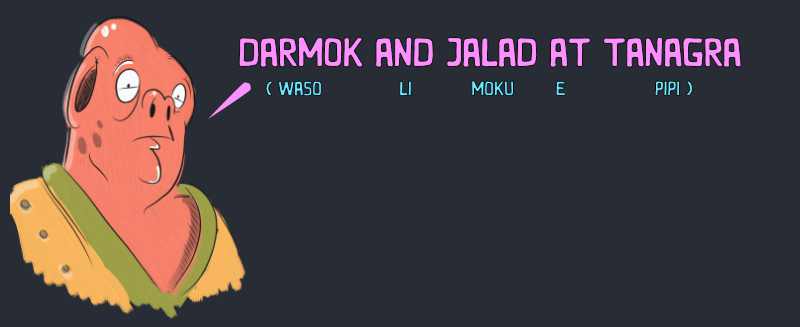lesson 3 - mi wile toki nasa! 1/2
In this second lesson, we will listen to another piece from the first episode of the kalama sin podcast. In this episode, kili pan Juli tells us why he felt like learning a weird language like toki pona. It all started with an episode of Star Trek (Tawa Mun)…
In this episode, the crew goes to meet a very singular group of people since they express themselves only by metaphor. Brilliant!

Let’s listen to the audio clip:
| 75% speed | |
|---|---|
|
|
|
| The transcripts are at the end of the page. |
1 - KIPISI WAN
We’re going to break this down into four short passages. On this page, we will work on the first two parts.
FIRST PART
- Listen and focus only on spotting the 4 expressions below.
- Have a look at the notes about [te-to] and [lon].
- Listen again and write on a paper all the words you understand
- Look at your paper and try to make sense of it.
- Listen again and enjoy your 80% comprehension.
- if necessary, repeat step 2 and 3. And then 4.
- Finish by doing the exercices.
1 KULUPU NIMI
People from anywhere but Earth :
A huge device to travel in space :
A tool that brings knowledge (like a computer) :
| 75% speed | |
|---|---|
|
|
|
2 TE … TO
These two words represent quotation marks. Oh sure, you can replace them with a finger gesture… but it’s very 2000’s.
| Exemples | |
|---|---|
3 LON
it might bother you right now but it may become your best friend.
- As a verb, it means to exist, be present/real/true.
- It is often used to say “there is”.
- It is also found here with the meaning of “taking place”.
4 ANTE TOKI
Can tou translate this ?
Darling, where are you? olin o, sina lon seme? Is there something to eat in the fridge? moku li lon ala lon ilo lete? They are in London. ona li lon ma Lanten They live in London. ona li lon ma Lanten They are from London. ona li tan ma Lanten
5 KUTE LI SONA
Listen again and try to find answers to these obvious questions.
What did you hear between te andto ?Is star Trek from the past or the future? What are people trying to do in space? Do all aliens speak English? So how can we understand them?
SECOND PART
- Read the vocabulary and write all the words on a paper
- Play with them for a few minutes (making sentences in your head)
- When you feel confortable with all of them, listen and spot them.
- Read the note about PI. Make the exercices. Feel better about PI.
- Listen to the audio : how many PI did you hear ?
- Listen to the audio and try to understand everything.
- If it’s still difficult, read & translate the transcription and try 6 again
| 75% speed | |
|---|---|
|
|
|
| movie or anything alike | |
| In English, it is… | |
| to meet, to encounter | |
| the meaning of the speech |
6 SONA
We are talking about the 2nd episode of the fifth season of Star Trek: The Next Generation and it is called “Darmok” (
7 PI
I know you’ve already read all about
=> [ SOMETHING ] + [ONE WORD MODIFIER]
=> [ SOMETHING ] + PI + [TWO WORDS MODIFIER] (or more than two)
The great thing about toki pona is that a modifier can be much more than a simple adjective as we know them in English. Observe:
| — | PI ? | Exemple | |
|---|---|---|---|
| 1 | |||
| 2 | |||
| 3 | |||
| 4 | |||
| 5 | |||
| 6 | |||
| 7 | |||
| 8 |
8 KULUPU NIMI
Make a sentence with these modifiers:
tawa kon loje pimeja lete mama mi wile mani mute (expensive) wile sona (curious)wile musi utala (competitive)
See? Easy. Time for the third part!
Transcriptions
PART ONE
mi kama sona e toki pona tan seme?
tenpo pini la mi lukin e sitelen tawa te Tawa Mun to.
(toki Inli la nimi ona li Star Trek).
ona la tenpo kama li lon.
jan ma li kepeken ilo suli pi tawa mun li alasa e sona mun.
jan mute pi mun ante li kepeken toki ante.
taso, ilo sona li lon.
kepeken ilo la jan ma li ken sona e toki ale pi jan mun.
PART TWO
tenpo la mi lukin e sitelen tawa nanpa Tamo.
(toki Inli la nimi li Darmok.)
ona la jan ma li kama lukin e jan pi mun ante.
jan mun ni li toki kepeken nasin pi nasa mute!
ilo li sona e nimi ale lon toki ona.
taso, kon toki li sona ala!